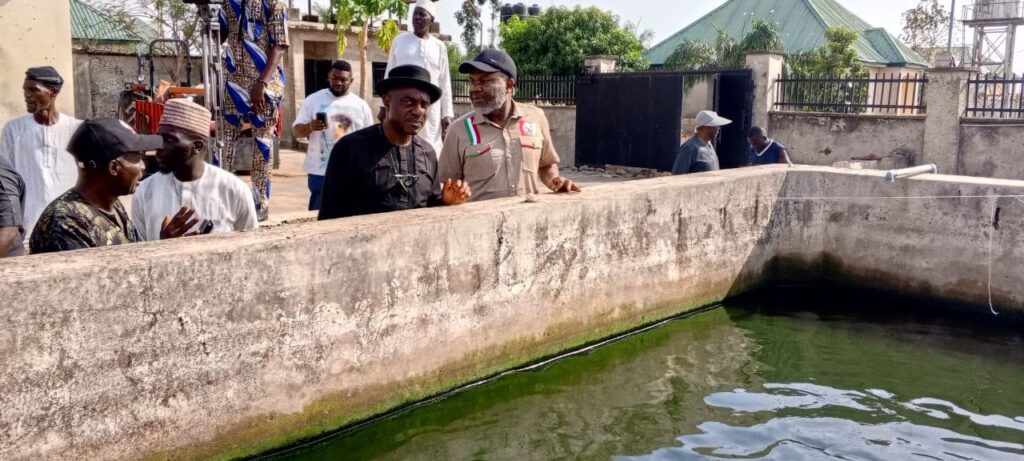The House of Representatives Committee on Federal Capital Territory (FCT) Area Councils and Ancillary Matters has summoned the Minister of State for the FCT, Mariya Bunkure, over the deplorable state of the Fish Farm Estate in Bwari, Abuja.
The Chairman of the Committee, Fred Agbedi, made this known during an oversight visit to the estate on Monday, expressing deep displeasure at the condition of the facility, which he said runs contrary to President Bola Tinubu’s vision of achieving food security for Nigerians.
Agbedi described the Estate as a noble initiative that had been completely abandoned.
“This committee, today, in continuation of its oversight on the agriculture department, visited this estate. And to our surprise and chagrin, it is very clear that this noble idea has been abandoned,” he said.
He observed that basic infrastructure such as electricity, water supply, drainage systems, and access roads were lacking, rendering the facility non-functional.
“There’s no electricity, no water, no drainage system, and no access road. There are no proper channels to evacuate wastewater from the various fish farms. There are also no staff to manage the facility, and security remains a major concern,” he added.
Agbedi noted that the current state of the estate contradicts the president’s efforts to position Nigeria as an agricultural hub and ensure food security.
Consequently, the Committee resolved to summon the FCT Minister of State, who supervises the agriculture department, to appear before it and explain the circumstances behind the neglect of the Farm Estate.
“We hereby invite the Minister of State for FCT, who supervises this department, to appear before this committee so we can address the issues concerning the functionality of this estate,” Agbedi said.
Sympathizing with residents and investors who partnered with the government in good faith, Agbedi said:
“When our citizens, who are productive and knowledgeable in fish farming, partner with the government by investing their resources to contribute to national development, and the government reneges on its part, it is disheartening.”
He described the situation as a breach of trust and pledged that the Committee would not sit idly by while the government defaults on its responsibilities.
“As a supervising committee, we cannot fold our arms and watch the government fail to revamp a sector as vital as fish farming, which can boost the economy and improve livelihoods.”
He assured stakeholders of the National Assembly’s commitment to restoring the farm to its original vision.
“We want to assure you that we will do our best as the National Assembly. We are here on behalf of the Speaker, who constituted this committee to oversee this sector. Working with him, we will ensure this estate is revived.”
In his response, Acting Director of Fisheries and Aquaculture at the Agriculture and Rural Development Secretariat, Dabit Agbo, explained that the project was initiated following the 38th annual conference of the Nigerian National Fisheries Development Committee, which identified excessive fish importation as a major concern.
Agbo said the project commenced in 2012 but had been unable to meet its objectives due to inadequate budgetary allocations.
He explained that it was a pilot project, designed to be replicated in all 36 States, with the Federal government providing infrastructure while private investors operated the farms to boost local fish production.
According to him, the Estate was designed to accommodate 100 fish farmers, but only eight currently operate there, bearing the cost of infrastructure themselves, an arrangement he described as far from ideal.















